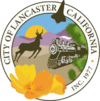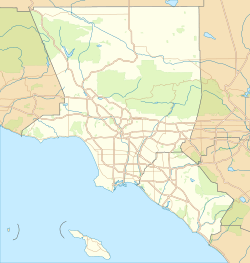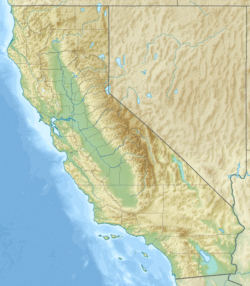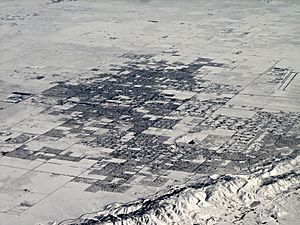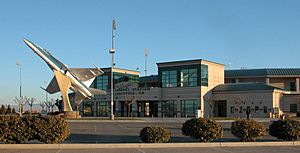Lancaster, California facts for kids
Quick facts for kids
Lancaster, California
|
|||
|---|---|---|---|
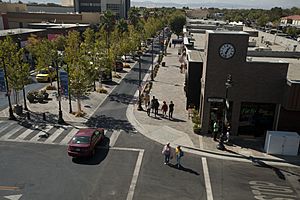
Downtown Lancaster
|
|||
|
|||
| Motto(s):
Creating a better tomorrow. Together.
|
|||
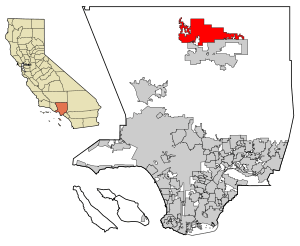
Location in Los Angeles County, California
|
|||
| Country | |||
| State | |||
| County | |||
| Incorporated | November 22, 1977 | ||
| Government | |||
| • Type | Council-manager | ||
| Area | |||
| • Total | 94.54 sq mi (244.87 km2) | ||
| • Land | 94.28 sq mi (244.19 km2) | ||
| • Water | 0.26 sq mi (0.68 km2) 0.29% | ||
| Elevation | 2,359 ft (719 m) | ||
| Population
(2020)
|
|||
| • Total | 173,516 | ||
| • Density | 1,835/sq mi (645.41/km2) | ||
| Time zone | UTC−8 (Pacific) | ||
| • Summer (DST) | UTC−7 (PDT) | ||
| ZIP Codes |
93534–93536, 93539, 93584
|
||
| Area code | 661 | ||
| FIPS code | 06-40130 | ||
| GNIS feature IDs | 1652741, 2411620 | ||
Lancaster is a city in northern Los Angeles County, California. It is located in the Antelope Valley part of the western Mojave Desert. In 2020, about 173,516 people lived there. This makes Lancaster one of the largest cities in California.
Lancaster is often called a "twin city" with its neighbor, Palmdale. Together, they are the main cities in the Antelope Valley area. The city is about 70 miles north of downtown Los Angeles. It is separated from Los Angeles by the San Gabriel Mountains. Since it became a city in 1977, Lancaster's population has grown a lot.
Contents
History of Lancaster
The Antelope Valley, where Lancaster is today, was first home to the Paiute tribe. This area was a key trading spot for different tribes. They traded goods between the California coast, the Central Valley, and other regions.
Later, the Antelope Valley became a shortcut for important roads. These included the Stockton–Los Angeles Road and the Butterfield Overland Mail. Lancaster started as a settlement when the Southern Pacific Railroad built a station there in 1876. This railroad connected San Francisco and Los Angeles.
How Lancaster Got Its Name
The exact origin of Lancaster's name is not fully clear. Some say it came from a railroad clerk's last name. Others believe railroad officials gave it the name. It might also be named after Lancaster, Pennsylvania, by early settlers.
Train service brought many new people to the area. A person named Moses Langley Wicks helped develop the town. In 1884, he bought land from the railroad. He then planned out streets and lots for the town. By 1890, Lancaster was growing fast. Farmers grew lots of wheat and barley thanks to good rainfall.
Early Challenges and Discoveries
A long drought starting in 1894 hurt the town. Many businesses struggled, and cattle had to be moved. However, things got better in the late 1890s. Gold and borax were discovered nearby. The Tropico Gold Mine in Rosamond was once the biggest gold mine in Southern California. The Pacific Coast Borax Company mine became the world's largest borax mine. It produced almost half of the world's borates.
In 1912, Antelope Valley High School opened. This allowed students to study locally. It was the first high school in California with dormitories.
Modern Developments in Lancaster
Lancaster State Prison opened in 1993. This was the first state prison in Los Angeles County. In 2005, Hyundai Motor Co. opened a large testing facility nearby. This "Proving Ground" is used to test cars and SUVs.
In 2010, the city opened "The BLVD." This is a redesigned part of Lancaster Boulevard. It has helped to bring new life to the downtown area.
City leaders want Lancaster to be the first "Net-Zero" city in the nation. This means the city would produce more clean energy than it uses. Many city buildings, schools, and even the baseball stadium use solar power. In 2013, Lancaster became the first U.S. city to require solar panels on all new homes. This rule started in January 2014.
War Eagle Field / Mira Loma
War Eagle Field was an airfield located west of Lancaster. It was a flight school during World War II. In 1944, it became Mira Loma Flight Academy. The airfield closed in 1945. Later, Los Angeles County bought the land. It was turned into the Mira Loma Detention Center. In 2012, the detention center closed. The county and city are now working to turn it into a winter shelter.
Geography and Climate
Lancaster is in a semi-arid climate zone. This means it's mostly dry, like a desert. The area is covered by shrublands, forests, and grasslands.
Weather in Lancaster
Winters in Lancaster are cool, with temperatures sometimes freezing. Summers are hot and very dry. Each year, there are about 68 mornings with freezing temperatures. There are also about 35 afternoons where temperatures reach 100°F (38°C) or higher.
Lancaster gets about 6.81 inches (173 mm) of rain each year. Most days are clear and sunny. Even in winter, the surrounding mountains get snow. Thunderstorms are rare, but they can happen from July to September.
In spring, many wildflowers bloom. These include California Poppies, Lupines, and Fiddlenecks. Summer nights are cool. The average snowfall is about 2 inches (5 cm) per year. The highest temperature ever recorded was 115°F (46°C) on June 30, 2013. The lowest was 2°F (-17°C) on December 24, 1984.
| Climate data for Lancaster, California (General William J. Fox Airfield), 1991–2020 normals, extremes 1945–present | |||||||||||||
|---|---|---|---|---|---|---|---|---|---|---|---|---|---|
| Month | Jan | Feb | Mar | Apr | May | Jun | Jul | Aug | Sep | Oct | Nov | Dec | Year |
| Record high °F (°C) | 80 (27) |
84 (29) |
91 (33) |
98 (37) |
106 (41) |
115 (46) |
115 (46) |
113 (45) |
113 (45) |
106 (41) |
90 (32) |
85 (29) |
115 (46) |
| Mean maximum °F (°C) | 70.7 (21.5) |
74.3 (23.5) |
81.4 (27.4) |
89.8 (32.1) |
96.4 (35.8) |
104.0 (40.0) |
107.7 (42.1) |
106.4 (41.3) |
102.3 (39.1) |
93.1 (33.9) |
81.0 (27.2) |
71.0 (21.7) |
109.1 (42.8) |
| Mean daily maximum °F (°C) | 58.7 (14.8) |
61.5 (16.4) |
67.2 (19.6) |
72.9 (22.7) |
81.6 (27.6) |
91.3 (32.9) |
97.6 (36.4) |
97.8 (36.6) |
91.4 (33.0) |
80.0 (26.7) |
67.0 (19.4) |
57.7 (14.3) |
77.1 (25.0) |
| Daily mean °F (°C) | 45.0 (7.2) |
48.0 (8.9) |
53.5 (11.9) |
58.9 (14.9) |
67.5 (19.7) |
76.4 (24.7) |
82.4 (28.0) |
81.3 (27.4) |
74.2 (23.4) |
62.9 (17.2) |
51.0 (10.6) |
43.7 (6.5) |
62.1 (16.7) |
| Mean daily minimum °F (°C) | 31.3 (−0.4) |
34.5 (1.4) |
39.8 (4.3) |
44.9 (7.2) |
53.4 (11.9) |
61.5 (16.4) |
67.2 (19.6) |
64.7 (18.2) |
56.9 (13.8) |
45.8 (7.7) |
35.0 (1.7) |
29.7 (−1.3) |
47.1 (8.4) |
| Mean minimum °F (°C) | 19.3 (−7.1) |
22.0 (−5.6) |
27.0 (−2.8) |
32.0 (0.0) |
40.9 (4.9) |
48.8 (9.3) |
56.2 (13.4) |
53.8 (12.1) |
44.6 (7.0) |
32.1 (0.1) |
21.3 (−5.9) |
16.4 (−8.7) |
14.8 (−9.6) |
| Record low °F (°C) | 3 (−16) |
11 (−12) |
17 (−8) |
23 (−5) |
32 (0) |
38 (3) |
45 (7) |
43 (6) |
27 (−3) |
18 (−8) |
12 (−11) |
2 (−17) |
2 (−17) |
| Average precipitation inches (mm) | 1.46 (37) |
1.76 (45) |
0.96 (24) |
0.39 (9.9) |
0.10 (2.5) |
0.05 (1.3) |
0.14 (3.6) |
0.01 (0.25) |
0.12 (3.0) |
0.34 (8.6) |
0.37 (9.4) |
1.11 (28) |
6.81 (172.55) |
| Average precipitation days (≥ 0.01 in) | 5.0 | 5.3 | 4.3 | 2.2 | 1.0 | 0.3 | 0.7 | 0.3 | 0.5 | 1.6 | 2.2 | 4.4 | 27.8 |
| Source 1: NOAA | |||||||||||||
| Source 2: National Weather Service | |||||||||||||
People Living in Lancaster
| Historical population | |||
|---|---|---|---|
| Census | Pop. | %± | |
| 1960 | 26,012 | — | |
| 1970 | 30,948 | 19.0% | |
| 1980 | 48,027 | 55.2% | |
| 1990 | 97,291 | 102.6% | |
| 2000 | 118,718 | 22.0% | |
| 2010 | 156,633 | 31.9% | |
| 2020 | 173,516 | 10.8% | |
| U.S. Decennial Census | |||
Population in 2020
In 2020, Lancaster had a population of 173,516 people. The city is very diverse. Many different racial and ethnic groups live there.
| Race / Ethnicity (NH = Non-Hispanic) | Pop 2000 | Pop 2010 | Pop 2020 | % 2000 | % 2010 | % 2020 |
|---|---|---|---|---|---|---|
| White alone (NH) | 62,256 | 53,576 | 42,321 | 52.44% | 34.20% | 24.39% |
| Black or African American alone (NH) | 18,548 | 30,859 | 35,497 | 15.62% | 19.70% | 20.46% |
| Native American or Alaska Native alone (NH) | 706 | 663 | 704 | 0.59% | 0.42% | 0.41% |
| Asian alone (NH) | 4,348 | 6,474 | 7,699 | 3.66% | 4.13% | 4.44% |
| Pacific Islander alone (NH) | 231 | 295 | 250 | 0.19% | 0.19% | 0.14% |
| Other Race alone (NH) | 426 | 621 | 1,299 | 0.36% | 0.40% | 0.75% |
| Mixed race or Multiracial (NH) | 3,559 | 4,549 | 7,408 | 3.00% | 2.90% | 4.27% |
| Hispanic or Latino (any race) | 28,644 | 59,596 | 78,338 | 24.13% | 38.05% | 45.15% |
| Total | 118,718 | 156,633 | 173,516 | 100.00% | 100.00% | 100.00% |
Population in 2010
In 2010, Lancaster had 156,633 people. About 94.7% of the people lived in homes. The rest lived in group homes or institutions.
There were 46,992 households. About 46.9% of these had children under 18. The average household size was 3.16 people. The average family size was 3.62 people.
About 30.1% of the population was under 18 years old. The median age was 30.4 years. The median household income was $50,193. About 21.5% of the people lived below the poverty line.
Economy and Jobs
Lancaster has several business and industrial parks. These areas help bring major companies to the city. Companies like SYGMA, Rite Aid, and Bank of America have operations here. The city's economic department works to attract new businesses. They also help bring retail stores and restaurants to shopping centers.
Revitalizing Downtown Lancaster
The city has worked to improve Downtown Lancaster, known as The BLVD. This area mixes old buildings with new places like a library and a performing arts center. Businesses in the area have helped renovate buildings. New boutiques and restaurants have opened.
Partnership with BYD
In 2009, Mayor R. Rex Parris wanted to attract Chinese manufacturing companies. He visited China to explore trade opportunities. This led to a partnership with BYD, a company that makes batteries, solar panels, and electric vehicles.
Lancaster and BYD worked together on a "Home of the Future" project. This project used BYD's energy technology to build affordable, energy-efficient homes. In 2013, BYD opened two manufacturing facilities in Lancaster. These include a factory for electric buses and another for large-scale batteries. By 2019, BYD Lancaster had made over 300 electric buses. Lancaster has the most solar power production per person in California.
Shopping Areas
Lancaster has several shopping centers. These include Valley Central Way, Lancaster Boulevard (The BLVD), and Lancaster Commerce Center. There are also West Lancaster Plaza Shopping Center and other retail areas.
Arts and Culture in Lancaster
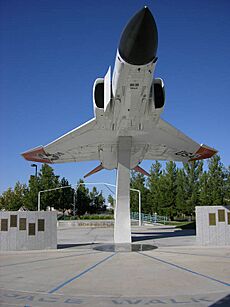
The city of Lancaster focuses on arts and culture. This helps the local economy.
Lancaster Museum of Art and History (MOAH)
The Lancaster Museum of Art and History, or MOAH, opened in 2012. It is located in The BLVD downtown area. MOAH has four locations in the city. It has over 10,000 art pieces about Southern California.
The BLVD Cultural District
In 2018, downtown Lancaster became The BLVD Cultural District. This is one of California's special cultural areas. The district hosts family days and a mural festival called POW! WOW! Antelope Valley. This festival has added almost 50 murals by famous artists. The BLVD project was finished in 2010. It has attracted many visitors.
The Western Hotel is the oldest building in Lancaster, built in 1876. It is now a museum. The Lancaster Performing Arts Center is also in the district. It hosts many shows, from local plays to concerts by famous artists.
The BLVD Cultural District also has the Lancaster Aerospace Walk of Honor. This honors test pilots who worked at Edwards Air Force Base. Five honorees are added each year in September.
The Musical Road
Lancaster has the first musical road in the United States. This road "plays" part of the William Tell Overture. It was first built by Honda for a TV commercial. After some complaints, it was moved to a new location. It is now at 30th Street West and Avenue G. This new location is far from homes.
Special Events in Lancaster
- California Poppy Festival: Each spring, this festival brings over 60,000 people to Lancaster City Park. It celebrates the California Poppy, the state flower. The festival started as an Earth Day event.
- Streets of Lancaster Grand Prix: In October, the city hosts a professional go-kart racing event. It includes a street festival, live music, and a car show.
- Antelope Valley Gem and Mineral Club Show: This annual show happens in April. Visitors can see rare rocks, gemstones, and handmade jewelry.
- Miss Lancaster Pageant: This event takes place every June. The winner represents Lancaster at the Miss Antelope Valley Pageant.
- BLVD Market: This is a farmers market held every Thursday year-round on Lancaster BLVD.
Other Fun Places
Lancaster has over 600 acres of parks. These include playgrounds, picnic areas, and sports facilities. The Prime Desert Woodland Preserve helps protect the desert's beauty. It also teaches people about the environment. Forrest Hull Park is a popular dog park.
In 1996, the city built Lancaster Municipal Stadium, now called The Hangar. It was home to the Lancaster JetHawks baseball team for many years. Now, it is home to the Lancaster Sound Breakers, a professional baseball team.
Sports Teams
Lancaster Sound Breakers
The Lancaster Sound Breakers are a professional baseball team. They are part of the Pecos League. The team played its first home game in May 2023 at The Hangar.
Parks and Recreation
The city plans to create a network of trails and bikeways. This network will connect homes, shops, and recreational areas. It will be for people of all ages and abilities, including those who ride horses. The plan aims to encourage healthier ways to travel in Lancaster.
Education in Lancaster
Public Schools
Lancaster has three elementary school districts: Eastside Union School District, Westside Union School District, and Lancaster School District.
The city also has the Lancaster CARES after-school program. This program works with the Lancaster School District. It offers learning activities and mentors for children.
The Antelope Valley Union High School District manages all high schools in Lancaster.
- SOAR High School: This is a special high school on the Antelope Valley College campus. It's an Early College High School. Students can take college courses while in high school. Successful students can earn both a high school diploma and a college degree in five years. SOAR High School focuses on math, science, and engineering.
- Career Academies: The Antelope Valley Union High School District has six Career Academies. These include programs in engineering, law, digital design, agriculture, and health careers.
- International Baccalaureate (IB) Program: Quartz Hill High School offers the IB program. This program helps students develop critical thinking skills.
Private Schools
Lancaster has several private schools. Some of these include Bethel Christian School, Desert Christian Schools, and Paraclete High School.
Charter Schools
Charter schools in Lancaster include Academy for the Advancement of Children with Autism and Antelope Valley Learning Academy.
Higher Education
Lancaster is home to several colleges and universities.
- Antelope Valley College: This is the oldest college in the Antelope Valley. It was founded in 1929.
- California State University, Bakersfield-Antelope Valley: This campus offers many bachelor's and master's degrees.
- West Coast Baptist College: This college offers degrees in religious studies.
- Lancaster University Center: This center helps local students get a good education in engineering and technology. California State University, Long Beach offers engineering degrees here.
Media in Lancaster
Newspapers
- AV News
- Antelope Valley Press
- AV Political Observer
- Los Angeles Times
Radio Stations
AM Stations
- KAVL 610 Sports
- KTPI 1340 Adult Standards
- KOSS 1380 News/Talk
- KUTY 1470 Mexican Oldies
FM Stations
- KCRY 88.1 FM NPR
- KTLW 88.9 FM Religious/Christian
- KLXP 89.7 FM Religious/Christian
- K211EY 90.1 FM Religious/Christian
- K216FA 91.1 FM Religious/Christian
- KWTD 91.9 FM Religious/Christian
- KQAV 93.5 FM Old School
- KTPI-FM 97.7 FM Country
- KKZQ 100.1 FM The Quake (Rock)
- KRAJ 100.9 FM The Heat Hip Hop
- KSRY 103.1 FM Modern Rock
- KGBB 103.9 FM Adult Hits
- KEPD 104.9 FM Country
- KVVS 105.5 Kiis FM
- KGMX 106.3 FM Adult Contemporary
- KMVE 106.9 FM Light Rock
- ((KLOS)) 95.5 FM Classic Rock
Television Stations
- KPAL 38 Home Shopping/ Christian programming.
- KILM 64 Independent, based in Victorville.
- KAVTV Time Warner Cable News on Channel 3
- KCAL CBS News on Channel 9
City Services and Transportation
Transportation in Lancaster
Airport
General William J. Fox Airfield (Fox Field) is the local airport. It used to have flights to Los Angeles, but now it does not have regular airline service.
Train Service
Lancaster station is the end of the Antelope Valley Line. This is a commuter train line on the Metrolink network. The train goes south from Lancaster through cities like Palmdale and Santa Clarita. It ends at Los Angeles Union Station. From there, you can connect to other train lines.
Law Enforcement
The Los Angeles County Sheriff's Department (LASD) provides law enforcement in Lancaster. The LASD has a station in Lancaster. The city also uses technology to help with safety. For example, citizens can file police reports online. In 2012, the city started using a small airplane with a camera to patrol the city.
Famous People from Lancaster
- Raymond Allen, TV actor
- Kevin Appier, former baseball player
- Chris Avalos, boxer
- Pancho Barnes, aviator
- Priscilla Barnes, actress
- Lon Boyett, NFL player
- Steve Buechele, baseball player
- Aaron Carter, singer and actor
- Dewayne Dedmon, NBA player
- John "Drumbo" French, musician, author
- Judy Garland, singer, actress
- Donald Glover, actor, writer, comedian and musician; born on nearby Edwards AFB
- Noah Gray-Cabey, actor
- Buddy Hackett, actor, comedian
- Sandy Hackett, actor and son of Buddy Hackett
- Edmond Hamilton, science fiction writer
- Bob Hannah, professional motorcycle racer
- Jon Howard, musician
- Miguel Ibarra, professional soccer player
- Al Krueger, professional football player
- Daniel Larson, baseball player
- John McKibbin, politician and businessman
- Dwayne Murphy, baseball player and coach
- Vinc Pichel, professional UFC mixed martial artist
- James Richards, professional football player
- George Runner, politician
- Sharon Runner, California state senator
- Dick Rutan, retired airforce pilot
- Burt Rutan, aerospace engineer
- James Sakoda, psychologist
- Chaz Schilens, former NFL player
- Bruce Van Dyke, former football guard
- Don Van Vliet, musician (as Captain Beefheart), painter
- Frank Zappa, musician, composer, satirist
- Patrick Watson, musician
- Adam Wheeler, Olympic Greco-Roman wrestler
- Joshua Kelley, NFL player
Sister Cities
Lancaster is a sister city with Namie, Fukushima, Japan.
Images for kids
See also
 In Spanish: Lancaster (California) para niños
In Spanish: Lancaster (California) para niños
 | Stephanie Wilson |
 | Charles Bolden |
 | Ronald McNair |
 | Frederick D. Gregory |



